Eating Disorders Catalogue
November 2017
Here’s what we know: People recovering from eating disorders not only benefit from – but require – a strong therapeutic alliance. It’s the same extremely vital therapeutic alliance which deteriorates if there’s a lack of humility (on the therapist’s part) (Davis et al, 2015, p. 491).
Here’s what we theorize: Cultural humility – which the APA defines as an aspect of cultural competency and which incorporates the therapist’s ever-growing attitudes toward their clients and themselves — is an emerging, yet essential part of treatment.
So, how can therapists practice cultural humility?
Because the main tenet behind cultural humility is that no one of us can ever be wholly competent in a culture not our own, therapists can humbly ask, “how can I better serve you?” and “how can I be more effective to you?” By asking, we are acknowledging several things. We’re saying that even in seemingly homogenous cultural “groups,” diversity exists. We are intentionally not assuming sameness even if we may share some intersecting identities with clients. We are also accepting that no matter the amount of travel, education, or experiences we possess, we will always be outsiders. These questions allow for curiosity alongside those we serve. They promote communion and dialogue. The idea is to be invited by others to walk alongside them; to allow them to guide you and vice versa; and to join together in a working alliance. In other words, we “attenuate the tendency for therapists to overvalue their own perspectives and world views (Fisher-Borne et al., 2015, p. 169).”
Here’s another important tenet of cultural humility: Power imbalances exist – whether because of role, race, class, sex, sexuality, gender identity, gender expression, or physical ability – and we can change power dynamics at a relational and institutional level. At the relational level we recognize each person’s unique area of expertise – i.e., the client as their own expert; the therapist as an expert in working with families – and we come together to learn from each other. At an institutional level we show flexibility in adapting to those we serve. We do this instead of reinforcing the all-too-common oppression a client faces when they are asked to flex to the agency’s dominant cultural norms. That kind of oppression harms the therapeutic alliance by disrupting the client’s and/or family’s sense of safety (Davis et al, 2015, p.491). Responsible use of power on an institutional level may also look like removing road blocks to treatment – whether that includes offering transportation assistance, child care, or meal cards when needed.
And now you ask, what does cultural humility look like when working with clients who have eating disorders?
It starts with understanding, as opposed to pathologizing. Let’s take, for example, a family who struggles with serving “well-balanced” meals. Perhaps the family differently defines what “balanced” means. Poor insight about this might lead the therapist astray and to label the family as “willful” or “defiant.” Thus, we use cultural humility to ask questions, engage one another, learn from each othe,r and share information.
We also consider others’ religious practices and how these impact treatment. For instance, in many religions, there are holidays where observers engage in fasting. We certainly do not want to mislabel religious fasting as “eating disorder behavior.” Practicing cultural humility allows us to include spiritual leaders as part of the treatment team to figure out how to best respect religious practices while caring for individual medical and psychological needs. It allows us to learn, for example, that “many religions will suspend fasting during medically necessary times (Daniel Le Grange, Ph.D., Treating Eating Disorders Conference, September 11, 2017).”
Other practices specific to eating disorder treatment are using in-person translators; avoiding technical jargon as this may encourage an environment of “us vs. them;” discussing cultures’ differing understandings of language being used with those we serve; using creativity and flexibility in meal planning; and asking ourselves and our mentors questions (e.g. “What am I not understanding that is prohibiting me from best serving this person?”).
And now, I’ll turn the mirror on myself. After all, how can I talk about cultural humility without taking a look at my own practices? How can you make sense of this article without having an understanding of the context of which I write?
So, here I go. I live as a part of the white dominant American culture. My experience is shaped by my identity as a person who is female-bodied and queer – both in the way I identify my gender and sexuality – and by growing up part of a family that is made up mostly of second generation assimilated Mediterranean people. I have taken time – throughout my years – to observe the pervasiveness of whiteness. In fact, I continue to learn about this.
In my practice as a therapist, cultural humility personally means acknowledging the intersecting identities of my clients, their families – and me. I’ve come to learn that cultural humility does not mean “erasing” my whiteness or any of the identities from which I live. It means I continuously engage in not knowing. I humbly consider – and reconsider – how the identities of my clients and their families shape them. I take “into account the fluidity and subjectivity of culture,” by developing ever-growing self-awareness and awareness of how cultural values shape client experiences (Fisher-Borne et al., 2015, p.171). And most importantly – and perhaps, most controversially – I recognize that the term “cultural competency” is dated as it suggests the possibility that one may acquire knowledge and clinical experience to the point of mastery.
While the framework of competency began the conversation on how to provide quality care, our accountability to our clients and their families only begins there and continues through the lives we live, the work we do, and the things for which we advocate using our communal power.
About the Author:
Christine Lang, MSW, M.Div., is an adolescent clinician in the partial hospitalization and intensive outpatient programs for Walden Behavioral Care, providing individual, family and group counseling for adolescents and families with eating disorders. This includes a specialized treatment track for LGBTQ individuals






